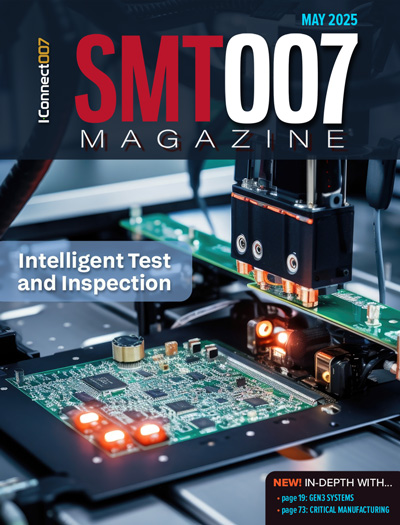-

-
News
News Highlights
- Books
Featured Books
- smt007 Magazine
Latest Issues
Current Issue
What's Your Sweet Spot?
Are you in a niche that’s growing or shrinking? Is it time to reassess and refocus? We spotlight companies thriving by redefining or reinforcing their niche. What are their insights?

Moving Forward With Confidence
In this issue, we focus on sales and quoting, workforce training, new IPC leadership in the U.S. and Canada, the effects of tariffs, CFX standards, and much more—all designed to provide perspective as you move through the cloud bank of today's shifting economic market.

Intelligent Test and Inspection
Are you ready to explore the cutting-edge advancements shaping the electronics manufacturing industry? The May 2025 issue of SMT007 Magazine is packed with insights, innovations, and expert perspectives that you won’t want to miss.
- Articles
- Columns
- Links
- Media kit
||| MENU - smt007 Magazine
Driven by Technology and Subject to US Tariffs, Global PCB Market is Expected to Grow by 5.5% in 2025
April 7, 2025 | TPCAEstimated reading time: 5 minutes
In 2024, the global PCB industry will demonstrate technology-driven and diversified development. AI servers and electric vehicle applications will become the main growth drivers.
The mobile phone and memory markets will gradually recover, driving a recovery in overall demand. Among them, HDI and HLC benefited from the growth of the AI server market and specification upgrades, and performed particularly well. According to preliminary statistics, the global PCB output value will grow by about 7.6% in 2024 to reach US$80.9 billion.
Looking ahead to 2025, the demand for AI servers and electric vehicles will continue to drive industry development. The global PCB market is expected to grow by 5.5%, with an output value of US$85.4 billion, and the market will develop steadily upward.
Regarding the development of the global PCB industry in 2025, the Taiwan Printed Circuit Association (TPCA) and the Industrial Technology Research Institute (ISTI) have sorted out three important key issues:
1. AI will gradually penetrate from the cloud to edge computing, and electronic products will once again undergo large-scale changes.
AI will gradually penetrate from the cloud to edge computing (Edge AI), which will set off a new wave of electronic product upgrades after 5G.
With the enhancement of data processing, machine learning and automation technologies, the demand for key components such as semiconductors, packaging and PCBs will increase simultaneously. In particular, functional innovations in smartphones, computers and wearable devices are expected to drive sales to rebound. Compared with the large language model (LLM) used in cloud AI, Edge AI's key technology sLLM (miniaturized large language model) has the advantages of lightweight, low inference cost and high elasticity. It is more suitable for applications with high requirements on cost and immediacy, and will further enhance the user experience. In 2025, Edge AI will become the focus of the market, and the advancement of emerging technologies such as DeepSeek will also accelerate the launch of new products and boost demand for high-end equipment, bringing more opportunities for the PCB and electronic components industry to enter the mid-to-high-end market.
2. EMS factories start Made in America, and the global trade pattern may change.
With Trump's re-election, in order to reduce the United States' dependence on overseas goods and improve the trade deficit, the US government plans to impose a 10-20% tariff on imported products, and even increase some goods to 60%. The "Made in America" policy is reshaping the electronics industry supply chain. In the past, most EMS factories moved to emerging markets such as Southeast Asia, India and Mexico. It is estimated that after 2025, the United States will become another important production base. Although the current production capacity in the United States remains to be seen, this trend will reshape the trade structure of the upstream industry and force the supply chain to adjust its export strategy to adapt to the market changes brought about by the US manufacturing policy. Whether it will affect the export and capacity allocation of the upstream PCB industry in the future remains to be seen.
In addition, TSMC also announced in early March that it would expand its investment in the United States by US$100 billion, which shows that the impact of the US government's series of tariff policies and high-end technology controls on Taiwanese companies has already fermented.
Currently, the global PCB production capacity is mainly concentrated in mainland China, which is the country affected by the first wave of tariffs. Industrial diversion will become the main response strategy. Although Thailand, as an emerging PCB production center, has not been included in the tariff list, it still poses risks. Companies must adjust production locations in advance, increase product added value, and expand new markets to reduce the impact of changes in trade policies.
At the TPCA Member Conference Benchmark Forum, which just ended in mid-March, TPCA also held a forum titled "The Impact of Trump 2.0 on PCBs and Countermeasures". Speakers at the meeting analyzed the new international situation brought about by "Trump 2.0" from multiple levels, including policies, industries, and corporate governance, and provided the industry with many directions for thinking, such as supply chain layout and restructuring, expanding opportunities for cooperation in other regions, adjusting investment strategies for tariff-derived industries, industrial changes in ASEAN and India, policies and regulations of host countries/importing countries/exporting countries, and the impact of US policies on ESG. These are all important issues that the industry must continue to pay attention to in the international political situation.
3. Thailand's PCB cluster faces a talent shortage, and mass production progress may be affected.
Since 2023, Taiwan and mainland China PCB companies have accelerated their layout in Thailand. By the end of 2024, more than 30 manufacturers have entered Thailand and plan to start mass production in 2025. However, as Thailand's PCB production capacity is expanded, local labor supply may become the biggest challenge in the short term.
Thailand's local labor force is limited and cannot support the rapid expansion of the PCB industry. Thai factories must rely on neighboring countries such as Myanmar and Laos for additional manpower, and must increase wages and benefits, which will further increase operating costs. To address the talent shortage, companies should establish a diverse local talent pipeline, cultivate technical talent through local industry-university collaboration, and enhance automated production capabilities to ensure the smooth implementation of mass production plans. To this end, TPCA also launched the PCB International Talent Training Program last year, and has started the first phase of training and job matching with three colleges and universities in Thailand, and continues to promote PCB talent training in Thailand. In August this year, it plans to integrate enterprises, schools and Thai official resources to establish a PCB Academy platform to help the industry overcome the talent shortage.
Looking ahead to 2025, the global PCB market is expected to maintain steady growth driven by demand for AI servers and electric vehicles. However, industrial development is still affected by technological changes and international trade policies, and the supply chain layout needs to be more flexible and responsive. Overall, PCB manufacturers need to strengthen high-end technology research and development, optimize supply chain management, and flexibly adjust market strategies to ensure steady growth amid global industrial changes.
Suggested Items
PCBAA Wins Summit Silver Award from the American Society of Association Executives
07/18/2025 | PCBAAPCBAA was one of 38 associations that earned Silver Awards for outstanding contributions for an entry titled: Chips Don’t Float: More Printed Circuit Boards Must be Made in America.
INSPECTIS AB ‘Makes it a Meal’ with Series U50s Advanced Kit
07/18/2025 | INSPECTIS ABFamous chefs the world over maintain that an entrée doesn’t make a great meal without side dishes. At INSPECTIS, we call those ‘sides’ an Advanced Kit.
July 2025 PCB007 Magazine: Sales—From Pitch to PO
07/18/2025 |Though all parts of a company are essential for holistic success, it is a foundational truth that a company lives and dies by its sales. If there are no sales, the company eventually ceases to exist, or as Henry Ford says, “Nothing happens until someone sells something.” In the July issue of PCB007 Magazine, we break down the sales stack and provide a guide to up your sales game.
Silicon Mountain Contract Services Enhances SMT Capabilities with New HELLER Reflow Oven
07/17/2025 | Silicon Mountain Contract ServicesSilicon Mountain Contract Services, a leading provider of custom electronics manufacturing solutions, is proud to announce a significant upgrade to its SMT production capability with the addition of a HELLER 2043 MK5 10‑zone reflow oven to its Nampa facility.
KONIG Launches KP400: Advanced 3D Digital Conformal Coating System for High-Density Electronics
07/15/2025 | KONIGKONIG, a leader in electronic packaging protection solutions, is proud to announce the launch of the KP400 3D Digital Packaging Solution—a breakthrough conformal coating system that brings new levels of precision, speed, and material efficiency to electronics manufacturing.


